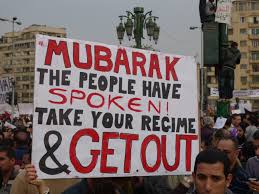 After recent developments in Tunisia there are now massive protests in Egypt. At first the numbers were small and dismissed by the government, but since the Muslim Brotherhood got involved protests have swelled. While there’s no reason, so far, to think Mubarak’s government will fall it’s likely the Muslim Brotherhood would fill any power vacuum if it did. Unfortunately, while Mubarak’s corrupt regime is hardly ideal, there’s little guarantee one under the Muslim Brotherhood would be better.
After recent developments in Tunisia there are now massive protests in Egypt. At first the numbers were small and dismissed by the government, but since the Muslim Brotherhood got involved protests have swelled. While there’s no reason, so far, to think Mubarak’s government will fall it’s likely the Muslim Brotherhood would fill any power vacuum if it did. Unfortunately, while Mubarak’s corrupt regime is hardly ideal, there’s little guarantee one under the Muslim Brotherhood would be better.
When regimes in the Middle East fall it’s rare a new government becomes democratic and accountable to its people. Egypt itself is an example: After Gamal Nasser and his officers overthrew the British puppet regime in 1952 promises of economic development and freedom were eventually put aside and replaced by an authoritarian state. Ba’athist revolutions in Syria and Iraq, Colonel Gaddafi’s rise to power in Libya, and the Iranian Revolution had the same results: The new rulers ended up being just as bad, often worse, than their predecessors. Given this poor record it’s hard to think the Muslim Brotherhood will be an exception.
Some point out most revolutions in the Middle East were by Arab Nationalists and Socialists, not Islamists like the Muslim Brotherhood. They suggest secular regimes become corrupt while religious ones keep the support of the people. This is false. The best-known Islamic Revolution, the Iranian Revolution, was popular at first, but most Iranians today want more political freedom and economic opportunities.
Religious based regimes in the Middle East aren’t more successful than their secular counterparts: Saudi Arabia has traditionally been more oppressive to its people than Syria or Iran, Hamas hasn’t delivered for the Palestinians in Gaza, and Hezbollah’s inclusion in Lebanon’s government hasn’t led to more peace and stability for the country. I’m not arguing Islam is bad, only that theocratic governments (whether Christian, Islamic or others) are not inherently democratic, stable or prosperous. Religion has a place in societies but there are valid reasons to separate church and state.
One reason to fear a Muslim Brotherhood regime in Egypt is the history of its organization. One of its early members, Sayyid Qutb, laid out doctrine for modern day Jihad and influenced Osama bin Laden, among other Islamic terrorists. Like Al-Qaeda it wants to re-establish the Caliphate, and has a hateful view towards Jews, Christians, and the West. It’s hard to see such a government maintaining positive relationships with Israel and the West.
Some believe if America engaged with such a regime they could find common ground. History suggests otherwise. America has tried courting such regimes and the usual results aren’t encouraging.
After the Shah was overthrown by the Ayatollah in Iran, the U.S. initially made efforts to live with the new regime. However, the theocrats in Tehran, realizing their legitimacy rested with hatred against Israel and the West, stormed the U.S. embassy and cut off relations with Israel, which had been a former ally. Other examples include regrettable support America gave to Saddam Hussein, and futile efforts to engage Syria. Even in the case of Cuba the Americans initially tried to win over Fidel Castro. It was only after Castro nationalized U.S. interests in Cuba unilaterally that America imposed the embargo.
Some point out the Muslim Brotherhood in Egypt has renounced violence and has committed itself to come to power through political means. Even if it were true that doesn’t mean they would remain peaceful if they came to power. It’s normal for such movements to discard violence when they’re weak, but most have no qualms using violence once they come to power. Usually it starts out small like attacking former elites, then escalates against new rivals, and finally against anyone seen as a threat. The P.L.O, Hamas, the Ayatollah, who all renounced violence before, used it after gaining political power.
What would happen to the Middle East if the Muslim Brotherhood came to power in Egypt? Would it succeed where similar movements have failed and bring democracy and economic prosperity to the Egyptians, and maintain positive relations with Israel and the West. There are precedents where this happened, at least initially. The U.S. supported Nasser at first, and Israel believed they could work with him, until pressure from the Arab World and Palestinians forced him to oppose them.
This would be the likely result if the Muslim Brotherhood came to power. Even if they wanted good relations with Israel and the West, pressure from the Arab masses, and likely continuation of economic stagnation, would force the Brotherhood to turn against the “Jews and Capitalists.” The only question is to what degree? Would they merely adopt the usual position of most regimes in the region that pay lip service to fighting for the Palestinians and the honour of the Muslim world? Or would they actively undermine Israel and America like Syria, Hizbillah, Hamas and Iran?
Most regimes tacitly back Washington because they’re either too weak, or dependent upon American aid. Egypt is the most powerful Arab country. It should be remembered Egypt held Iran’s current position of causing most trouble for America and Israel in the region for nearly thirty years until Anwar Sadat realized the horrific price it cost his nation and made peace. His reward for saving his country from further conflict was universal scorn and assassination by militants. His fate was not lost on other despots in the region.
However, while Egypt is strong it’s also dependent upon considerable American aid. While Washington would probably be tempted to end this if the Brotherhood came to power this would probably be a mistake. Since 1978 America has given Egypt over 80 billion dollars in military and economic assistance. Continued aid would be a significant bargaining chip America would have with the new regime.
Unfortunately, this alone doesn’t guarantee the Muslim Brotherhood would remain friendly. Like Cuba after the embargo, and Iran (which had been another significant recipient of U.S. aid) after the Shah, Egypt could find other donors with deep pockets. This includes oil rich Iran, or even Russia or China. Either way it’s possible the Egyptians, or at least Arab public opinion, would demand an end to U.S. aid to prevent the Muslim Brotherhood from looking like another American puppet in the region.
This means a new government in Egypt would likely turn its back on the alliance with America, and relatively peaceful relationship with Israel. But again we have to ask to what degree would the Brotherhood oppose them? While it’s reasonable to suggest they would be relatively restrained at first, focused on cementing their rule, once this was achieved there’s no way to tell what would happen afterwards. It’s possible they would remain content with passive lip service to the Palestinian cause and other sore points.
But is that realistic? Is it realistic a powerful, proud nation like Egypt that just threw off the shackles of a U.S. backed dictator, would retreat into isolationism? Realistic for a movement that proposes re-establishing the Caliphate, ending Western influence in the region, and fighting Israel, to remain passive while the Palestinians have no homeland and with ongoing wars in Afghanistan and Iraq? Is it realistic for a country that historically dominated the region to let others shape its destiny? To these questions there’s a good chance the answer would by no.
Most likely after a period of stabilization the new regime in Egypt would back Syria and Iran’s goals of ridding western influence, destroying Israel, and dominating the region. Initially Egypt would focus on supporting Hamas, Hezbollah, and other terrorist organizations fighting Israel and America. A conventional war with Israel would be unlikely (given the poor record of Egypt’s Army against the I.D.F.), though not impossible; many conflicts in the region begin by accidents and poor calculations by leaders. If Egypt closed the Suez Canal or the Straits of Tiran to Israeli shipping, as it did in 1967, it could provoke Israel into war.
The consequences of Egypt joining the rogue countries of the Middle East would redraw the balance of power in the region. Israel would again be confronted by the prospect of fighting a two front war, and many of the moderate regimes would find themselves isolated. America would have to consider diverting significant forces, perhaps a carrier group, to the Eastern Mediterranean on a semi-permanent basis to deter Egypt. Terrorist groups and other rogue nations would get a tremendous boost to their morale and increase their destructive efforts.
Ironically any move towards a satisfactory arrangement between the Palestinians and the Israelis would be quashed. Israel would return its focus on security, and the Palestinians and Arabs would demand no compromises as the balance would shift more in their favour.
This is what’s at stake. Either Mubarak’s regime survives, along with the current balance of power, or the Muslim Brotherhood comes to power and increases the likelihood of conflict in the region. In an ideal situation Mubarak would slowly pave the way to legitimate democracy, or at least relative prosperity, but this is very unlikely. Maybe his successor would be more open to real reform but only time would tell. Unfortunately, the alternatives are potentially much worse.
There is simply no compelling evidence, historical or modern, to suggest the Muslim Brotherhood would be democratic, peaceful, or enlightened rulers. For the Egyptians, it’s a no win situation.
